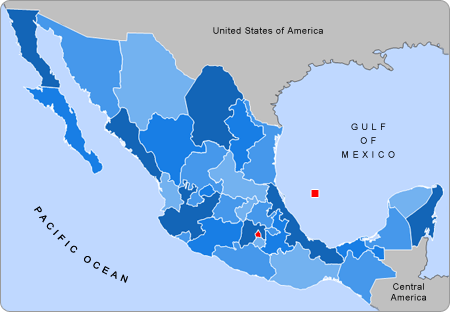Sex trafficking in Mexico
Sex trafficking in Mexico is human trafficking for the purpose of sexual exploitation and slavery that occurs in the United Mexican States. It is a country of origin, transit, and destination for sex trafficked victims.[1]

Sex trafficking victims in the country are from all ethnic groups in Mexico, including the indigenous peoples of Mexico,[2] and foreigners.[1] Mexican citizens, primarily women and girls, are sex trafficked to the different states of Mexico, as well as other countries, namely the United States.[3][4][2][5] Foreign women and girls are also trafficked to and within Mexico.[2][5][4][6][7] The illegal transporting and sexual assault of migrants from Latin America to the United States is a problem. Children,[3][8][9][2][6][5][10][11] and people in poverty[2][5][10] and with little education[2] are particularly vulnerable to sex trafficking. Perpetrators create fake identification documents, including birth certificates, for underage girls.[5] Sex trafficked victims are deceived[12][9][2][6][5][10] or abducted[11] and forced into prostitution and pregnancies. They are guarded or locked up[5] in brothels, bars, hotels,[2] homes, and other locations.[5][10] They are threatened[12][6] and physically and psychologically abused.[12][2][6][10] Their family members are sometimes threatened.[6][7] The babies and children of victims have been held hostage by perpetrators to ensure compliance.[4][10] Some traffickers impregnate their victims too keep them under their control.[5]Victims contract sexually transmitted diseases from rapes,[5] and often drugged[13] and live in poor living conditions. Victims experience mental health problems.[5] Some women and girls are tortured[12] and or murdered.
Sex trafficking and exploitation have permeated all levels of Mexican society. Male and female perpetrators[3] in Mexico come from a wide range of backgrounds and every social class. A number of traffickers are members of or facilitated by cartels and gangs.[9][2][5][4] Some government officials and workers, as well as foreigners, have profited from sex trafficking in Mexico. Police have been complicit.[4][5] Impunity is a problem.[2][5][11] Traffickers use social media and other phone and internet websites and apps to lure victims.[1] Pedophiles traffickers, from the United States and other countries, or men who contact the traffickers target children. They use clothing, toys, and candy to attract children to houses they rent or buy.[1] Some perpetrators are the victims’ family members.[5] Some victims are forced by their captors to be traffickers themselves.[14]
The scale of sex trafficking in Mexico is difficult to know because of the lack of data[1] from corruption,[12][1][10] poor record keeping, the secretive nature of sex trafficking crimes,[5] the fact that only a small minority of cases are reported to the authorities, and other factors. Local, state, and federal anti-sex trafficking efforts have been criticized for being insufficient. Authorities have been accused of being apathetic.[2][11] Anti-sex trafficking organizations, as well as victims’ families, in Mexico have received threats.[1][2][5][4]
Mexican Drug War
Drug cartels and gangs fighting in the Mexican War on Drugs have relied on sex trafficking as an alternative source of profit to finance their organizations, buy weapons, expand their territory, and for other purposes.[9][2][5][4] The cartels and gangs also abduct women to use as their personal sex slaves and force them into unfree labour.[9]
Non-governmental organization
Justicia para Nuestras Hijas (JPNH) supports victims and investigations of sex and labour trafficking in Mexico. It is supported by the United Nations Trust Fund for Victims of Human Trafficking.[15]
See also
References
- "Trafficking in Women and Girls and the Fight to End it". Latin American Bureau. November 26, 2014.
- "Tenancingo: the small town at the dark heart of Mexico's sex-slave trade". The Guardian. April 4, 2015.
- "Mexican Police Arrest Suspect in Trafficking Along US Border". VOA. October 13, 2018.
- "Hiding in plain sight, a hair salon reaches Mexican trafficking victims". The Christian Science Monitor. April 12, 2016.
- "Human trafficking survivors find hope in Mexico City". Deseret News. July 17, 2015.
- "DOJ: Mexican Sex Trafficking Organization Uses Southern Border to Smuggle Victims". People's Pundit Daily. January 7, 2019.
- "Thirty women rescued from sex trafficking in Mexico". ABS-CBN. November 26, 2017.
- "Mexico City will decriminalize sex work in move against trafficking". The Guardian. June 1, 2019.
- Grillo, Ioan (July 31, 2013). "The Mexican Drug Cartels' Other Business: Sex Trafficking". Time.
- "Human trafficking survivor: I was raped 43,200 times". CNN. September 20, 2017.
- "Human Trafficking 'Soaring in Mexico,' Rights Groups Warn". Telesur. December 27, 2017.
- "How a Mexican family became sex traffickers". Thomson Reuters Foundation. November 30, 2017.
- "Human trafficking in Mexico targets women and children". CNN. January 13, 2010.
- "FORCED PROSTITUTION AND HUMAN TRAFFICKING IN MEXICO". El Universal. September 22, 2019.
- "Our Funded Projects Around the World". United Nations Office on Drugs and Crime.
Further reading
- Zhang, Sheldon X.; Pacheco-McEvoy, Rodrigo & Campos, Roxanna (November 2011). "Sex trafficking in Latin America: dominant discourse, empirical paucity, and promising research". Global Crime. 13 (1): 22–41. Abstract.